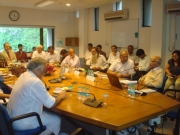Food stocks, food security, and India's stand on WTO Trade Facilitation: A shot in the arm or shooting yourself in the foot?
02 Sep 2014
Past Event

The deadline for ratification of the WTO’s Trade Facilitation Agreement (TFA) under the Doha Round was July 31, 2014. India under the Modi Government chose not to ratify the TFA, signed in December 2013 by the previous Manmohan Singh Government at the 9th WTO Ministerial Meeting in Bali, and widely heralded at that time as the first major decision of this century on global trade after the WTO came into being. The Government of India’s decision not to ratify was unexpected and sudden. In this seminar held at NCAER, Professor T.N. Srinivasan, Professor of Economics at Yale University and a Non-resident Senior Fellow at NCAER presented his very interesting viewpoints as he argued that India’s decision—on the grounds that discussion on finding a permanent solution to the issue of public food stocks had not started in the WTO work programme following the TFA adoption and that the developed countries were stalling meaningful discussion—was unwarranted and unwise. He shared his view that ratification now would have still left India ample time to push for a discussion on public stockholding and food security. Also, in any case, the TFA itself had set a deadline until the 11th Ministerial Conference in 2017 to find a permanent solution to the issue of public stockpiling for food security, with progress to be reviewed at the 10th Ministerial Conference in 2015. Srinivasan also spoke on the related issue of the Aggregate Measurement of Support (AMS) limits, the limits that WTO Members should not cross in their support to staple food crops, India missed an opportunity to avail of the ‘Peace Clause’ protection of the TFA. Professor Abhijit Sen of Jawaharlal Nehru University and Member, 14th Finance Commission carried on the discussions further . The seminar received an overwhelming response from a houseful attendees; representatives of researcher community, student groups and policy makers alike.
T. N. Srinivasan is the Samuel C. Park, Jr. Emeritus Professor of Economics and former Chairman of the Economics Department at Yale University, where he has taught since 1980, and a Non-resident Senior Fellow at NCAER. He was Special Adviser to the Development Research Center at the World Bank from 1977 to 1980, and has taught at numerous academic institutions, including MIT, Stanford, and the Indian Statistical Institute. He has authored a number of books and articles on economics, international trade, development economics and the Indian economy. He is a Visiting Fellow at the Stanford Center for International Development, a Distinguished Fellow of the American Economic Association, a Fellow of the Econometric Society, of the American Academy of Arts and Sciences and the American Philosophical Society, and a Foreign Associate of the US National Academy of Sciences. He received the Mahalanobis Memorial Medal of the Indian Econometric Society in 1975. He was awarded the Padma Bhushan by the President of India in 2007.










